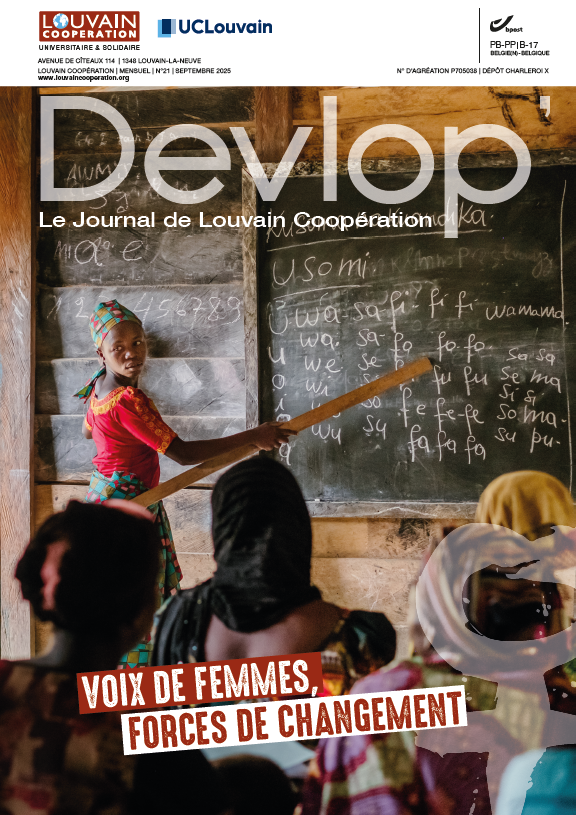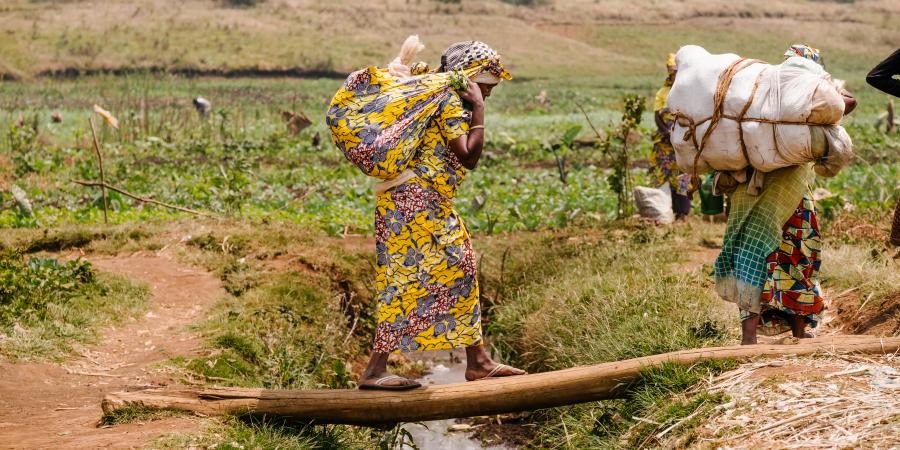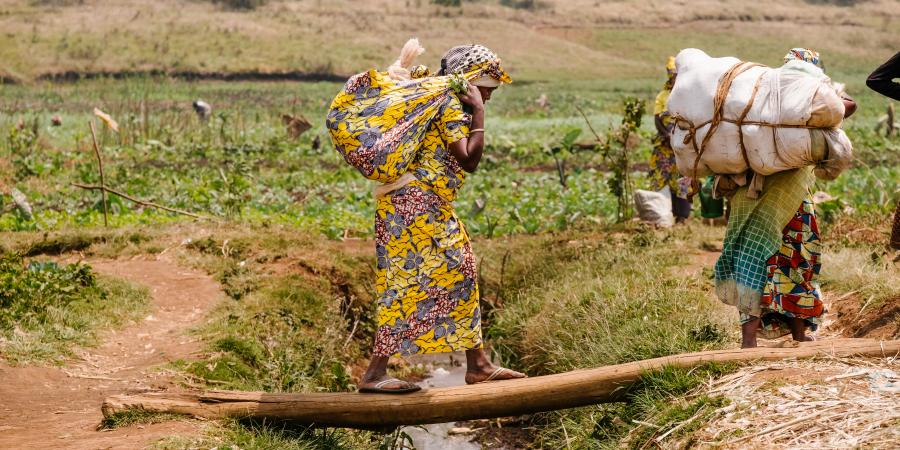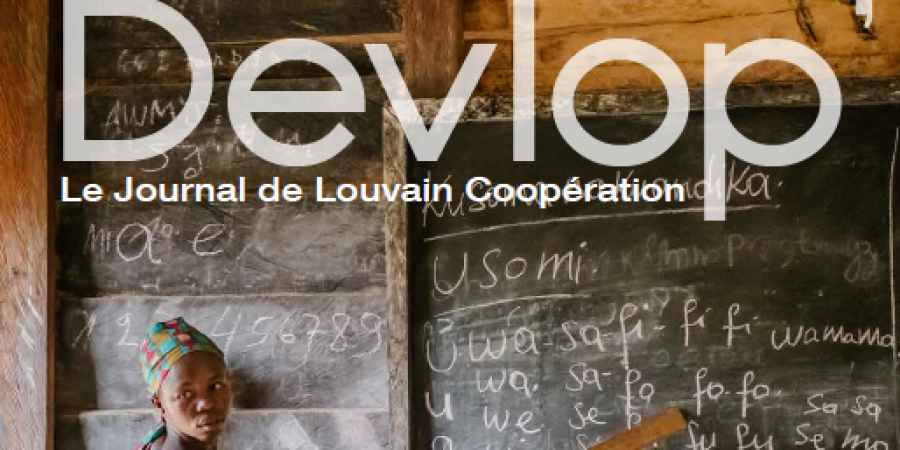
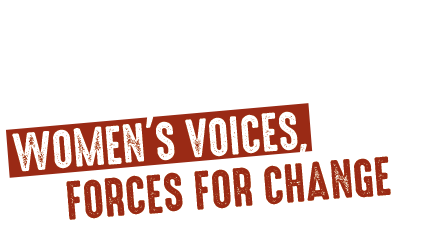
Edito
Women's economic leadership: an unfinished emancipation
In the past, figures such as Olympe de Gouges, with her Declaration of the Rights of Woman and the Female Citizen in 1791, laid the foundations for modern feminist demands for civil and economic equality. Centuries later, the acquisition and respect of women's fundamental rights to economic independence remain an unfinished battle throughout the world. At Louvain Coopération, our commitment to women's economic leadership stems from this observation: true equality cannot be achieved without dismantling the stereotypes and domestic barriers that hinder women's emancipation, and without transforming support structures and the division of labour to make them more equitable.
In the DRC, with the Observatoire de recherche sur l’Entrepreneuriat Féminin Durable Pour Elles (Research Observatory on Sustainable Female Entrepreneurship for Women), we are working to identify and overcome the socio-cultural barriers limiting female entrepreneurship. Our programmes to improve the financial independence of women fishermen in Madagascar and female entrepreneurship in South Kivu aim to empower those who are marginalised by traditional economic structures. When we support the socio-professional inclusion of single mothers in Haiti, we take into account the fact that behind women's access to leadership roles lies an often overlooked reality: the double burden that many women face, combining paid employment with domestic work, which is a major obstacle to their economic empowerment.
In Belgium too, how can we reconcile women's personal and professional fulfilment without trapping them in a spiral of exhaustion? Here, as elsewhere, is our job not simply to contribute to a reassessment of the place of human beings in our economies in order to rebuild our social contract? These are, in any case, central questions at Louvain Coopération, which drive our work and our thinking. And we are happy to share them with you in the following pages.
Sandrine Laroche
Project Monitoring Officer
This year, Louvain Coopération and the company BIA, through our partner Ondernemers voor Ondernemers (OVO), began a collaboration focused on entrepreneurship and literacy for women in Benin. Spotlight on this partnership, which is both human and financial.
BIA, headquartered in Overijse, distributes machinery for the mining and construction sectors. Present in some fifteen countries in West and Central Africa, it also provides maintenance and training for technicians working on this machinery. It has committed to supporting our literacy and entrepreneurial support project for cassava processors in Benin until 2026. Bénédicte Passagez and Virginia Cobo Hoyos, respectively responsible for sustainability and health, safety and the environment, tell us about this collaboration.
This year marks the thirtieth anniversary of the Beijing Declaration, an ambitious programme and global commitment to the rights of women and girls. Since then, progress has been made in several areas, but there is still a long way to go and, now more than ever, the road ahead is fraught with obstacles.
Thirty years ago, in September 1995, 189 governments signed the Beijing Declaration and Platform for Action, a historic and global commitment to the rights of women and girls. Political participation, employment, justice, eradication of violence, health... Twelve key areas of action were targeted, each accompanied by specific objectives and concrete measures to achieve them.
Significant progress
Three decades later, it is time to take stock, and it is clear that significant progress has been made. In its report entitled ‘The State of Women's Rights, 30 Years After Beijing’, UN Women notes that, overall, parity has been achieved in girls' education and maternal mortality has fallen by a third. Women's representation in parliaments has more than doubled, and countries continue to repeal discriminatory laws. The overall conclusion is that greater respect for women's rights has a positive impact on national economies.
How can you be independent and empower yourself when you cannot read or write? How can you manage a business without knowing numbers? Millions of women around the world face these questions every day, and the answer is, unfortunately, that it is very difficult, if not impossible.
In the countries where we work, the illiteracy rate among women ranges from 24% to 64% (see table). At best, this means that one in four women is unable to read or write. Literacy is now essential for improving women's status, leadership, financial independence and health through prevention messages.
Our partners therefore organise adult literacy courses in five countries: Benin, Burundi, Madagascar, DRC and Togo. Although the organisation varies slightly depending on the context, the courses always involve groups of around twenty adults, the vast majority of whom are women, who meet two to three times a week in a classroom, accompanied by a literacy teacher. Several levels of learning are targeted, as well as the associated qualifications.
Entrepreneurship and leadership in focus
While women's literacy is a goal in itself, our integrated approach encourages us to view it as part of a broader system, as a means of acquiring entrepreneurial skills and improving one's income, status and place in society. Learning is therefore structured around different professions and the terms needed to start a business. Marcelline Nijimbere is a literacy teacher in the province of Makamba, Burundi. She explains: "When women master reading and writing, they gain access to credit and can start commercial activities. Literacy classes teach them skills such as account management and measurement. They improve their social status and self-esteem, while opening up opportunities for community leadership. Literacy also has a positive influence on their children's education and future, helping to break the cycle of poverty."
Women's health cannot be reduced to simple medical monitoring and occasional treatment. Together with our partners, we take a systemic approach to health determinants, i.e. all the personal, social, economic and environmental factors that influence the health status of individuals and populations. These include, among others, income, education, employment, living conditions, individual behaviours (such as diet and physical activity) and the physical environment.
